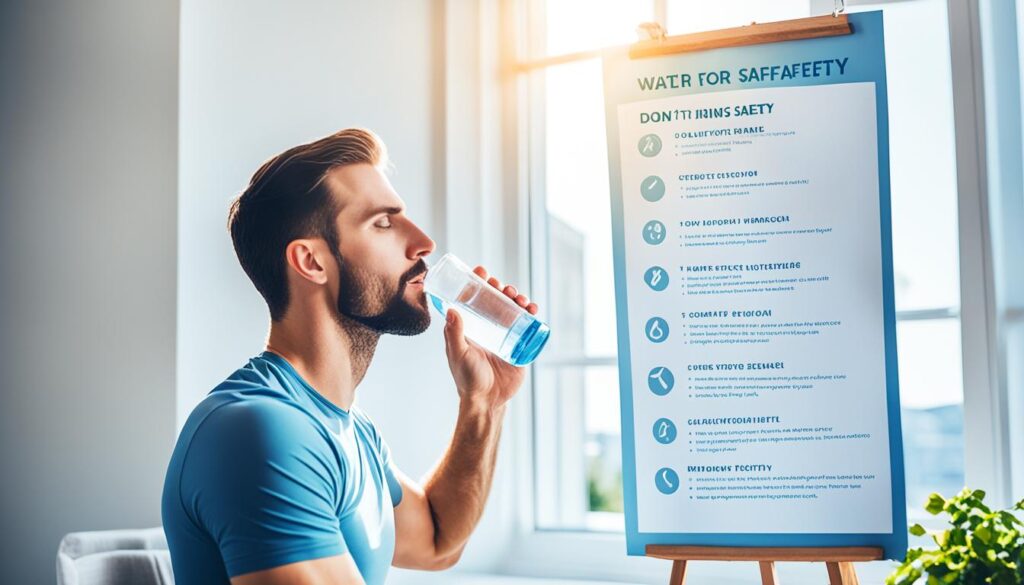Water fasting means you only drink water and don’t eat for up to 72 hours. Although it’s become popular for its possible health benefits, it’s very risky without the right know-how. This guide shares important safety tips for water fasting.
Not everyone should try water fasting. It’s not safe for kids, pregnant women, older people, and some with health conditions. It’s best for most people to not fast more than 24 hours. Drink 2-3 liters of water daily, especially water with minerals. This keeps you hydrated and your body’s minerals in balance.
After the fast, how you start eating again is crucial. Eating too much too quickly can cause refeeding syndrome. This is when your body has trouble with too many calories suddenly. To avoid this, start with little meals and stay away from processed foods. Knowing these tips makes water fasting safer and more beneficial.
Key Takeaways
- Consult healthcare professionals before starting a water fast, especially if you have existing health conditions.
- Limit fasting periods to no more than 24 hours at a time to reduce health risks.
- Consume 2-3 liters of mineralized water daily to stay hydrated and maintain electrolytes.
- Avoid strenuous physical activities during fasting to conserve energy.
- Slowly reintroduce food post-fasting to avoid refeeding syndrome, focusing on nutrient-dense, unprocessed foods.
- Individuals in high-risk groups should only fast under professional supervision.
- Gradual weight loss is more effective and sustainable than rapid weight loss, as noted by the CDC.
Introduction to Water Fasting
Water fasting is a method known since ancient times but popular now for health benefits. It means not eating any food and just drinking water for a certain time, usually 24 to 72 hours. To stay safe, experts say not to fast for over 24 hours in a row. They also stress the need to drink 2-3 liters of water a day during the fast. This keeps you well-hydrated.
Many people try water fasting to help with weight or to lower the chance of getting serious diseases like heart problems and diabetes. Doctors often point out that losing weight slowly is healthier than quickly. They mention that not everyone should try water fasting. It’s not for kids, old people, or anyone with certain health issues.
For a short time, water fasting can help lose weight by making the body better at handling blood sugar and knowing when it’s full. It might even help lower the risks of some diseases by changing the levels of fats in the blood and protecting the heart from damage. But, there are also risks like getting very dehydrated or feeling dizzy when you stand up.
When doing a water fast, it’s important to keep hydrated, avoid hard exercises, and know your body’s limits. Medical advice is a must if you plan to fast longer than 72 hours. Professionals can help make fasting safer by checking your blood pressure and other health signs. This prevents bad health effects from fasting too long.
If you’re very thin, pregnant, have heart problems, or certain diseases, you shouldn’t do water fasting without talking to a doctor first. Doing a long water fast without a doctor’s OK can be dangerous. Remembering the advice for safe water fasting practices is key to getting the good without the bad.
To try water fasting, think carefully about your health and follow safety steps. Knowing water fasting dos and don’ts helps you fast in a safe and healthy way. This way, you can reach your health targets without risking your well-being.
Preparing for Your Water Fast: Tips and Precautions
Starting a water fast takes careful planning for safety reasons. It’s key to know tips for a safe water fast and be aware of precautions to make the fast better.

Consult a Healthcare Professional
Talking to a healthcare professional before fasting is vital. They help figure out if fasting is safe for you. Not everyone should do a water fast. This includes kids, pregnant or nursing women, the elderly, and those with health issues.
Choose the Right Time
Picking the right time to fast is crucial. It should be a time when your body can rest. This means less physical activity. Your healthcare provider might suggest this too.
Mental and Physical Preparation
Getting ready for a water fast means easing into it. Start by cutting down on processed foods and following a healthy diet. The Mediterranean diet is a good choice. Drink plenty of mineralized water. This keeps you hydrated and helps avoid not getting enough nutrients.
By following these tips for a safe water fast and knowing important water fasting precautions, you can improve your fasting experience.
Water Fasting Safety Tips: Dos and Don’ts
If you’re looking into water fasting, understanding the guidelines is crucial. It’s vital for a safe and effective experience. Let’s explore key safety tips for water fasting.
Dos
- Stay Hydrated: It’s key to drink 2-3 liters of water daily, mainly mineralized water. This helps keep your electrolyte balance in check.
- Consult Healthcare Professionals: Talk to your doctor or a healthcare provider before you start. They can help you set the right goals based on your health.
- Rest and Conserve Energy: Cut back on hard activities. Instead, focus on rest to save and build up energy.
- Reintroduce Food Gradually: After fasting, eat smaller portions of food more often. This step eases your digestive system back into action.

Don’ts
- Avoid Long-Term Fasting Without Supervision: Most plans suggest not fasting more than 24 hours without a doctor. Longer fasts must be under medical care.
- Refrain from Vigorous Exercise: Don’t push your body with hard workouts when fasting. It can lead to feeling very tired and cause harm.
- Don’t Fast if High-Risk: Those with heart issues, pregnant women, and anyone with a history of eating disorders should steer clear. Only fast if a doctor says it’s safe.
Understanding what to do and what not to do makes water fasting safer and more beneficial. Always focus on staying hydrated, getting enough rest, and seeking medical advice when needed during your fasting period.
Potential Benefits and Risks of Water Fasting
Looking into the good points and problems with water fasting gives a clear picture. You have to see if the good things are worth any risks that come with it.
Health Benefits
Water fasting may help lower the chances of getting some big diseases. Things like cancer, heart issues, and diabetes might be less likely if you water fast sometimes. Doing it can also help your body clean itself by getting rid of old cell parts. This can lead to many health pluses.
In some cases, doing longer water fasts with a doctor’s help can lower high blood pressure. It might make you need to take less medicine for high blood pressure. And it can make your body work better when it comes to dealing with food and telling you when you’re hungry.
For instance, after just a day of not eating, 30 healthy people had lower blood fat levels. This is good because lower blood fat means you might not have as high a risk of getting heart problems.
Associated Risks
Water fasting isn’t all good. There are big dangers too. Doing it wrong can make you miss out on the nutrients your body needs. It can also make you lose too much water. And, it can even shock your body when you start eating again after the fast. This is worst for people who already have health issues like diabetes or kidney trouble.
You might lose weight in a bad way, or feel really dizzy when you stand up sometimes. People with certain health problems or who’ve had eating issues should be extremely careful. They should check with a doctor before trying water fasting.
| Benefits | Risks |
|---|---|
| Lower risk of chronic diseases (cancer, heart disease, diabetes) | Nutrient deficiencies |
| Promotion of autophagy | Dehydration |
| Enhanced leptin and insulin sensitivity | Refeeding syndrome |
| Lower blood triglyceride levels | Loss of muscle mass |
| Improvement in blood pressure with medical supervision | Orthostatic hypotension |
It’s vital to be aware of both the water fasting benefits and risks of water fasting. This helps in making smart choices about adding it to your life. Always talk to a doctor before starting a water fast. They can make sure it’s safe for you to do.
Conclusion
Water fasting can be good for your health in some ways, but it’s important to be careful. It’s best to fast for 24 to 72 hours only. Fasting longer can be risky without a doctor’s guidance. You might face problems like losing important nutrients and messing up your body’s salts.
Trying a water fast can help your body clean out old parts of cells. It might also drop the chances of getting serious diseases like diabetes, cancer, and heart problems. When you fast, your blood pressure could go down and you could lose weight. But be prepared to lose initial water weight, carbs, and some muscle too. Also, not eating means you won’t get usual water amounts from food, so you could get dehydrated.
Fasting with water might fit in a lifestyle aimed at health, but it’s not for everyone. People like kids, teens, pregnant or breastfeeding women, those over 75, and those with medical problems such as gout or diabetes should avoid it unless a doctor says it’s okay. It’s essential to get ready properly, know the upsides and downsides, and keep talking to a healthcare provider. These steps make fasting with water safer and more effective. Following these tips can help you stay on top of your health while fasting.




